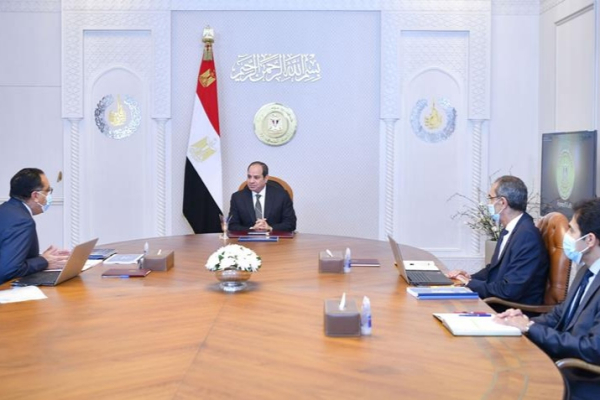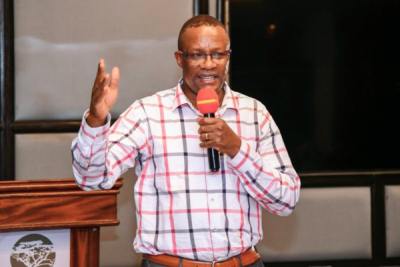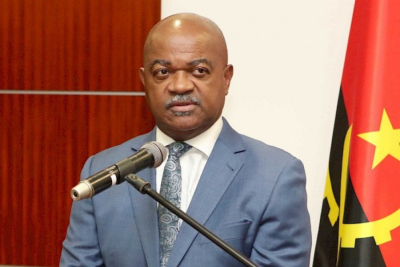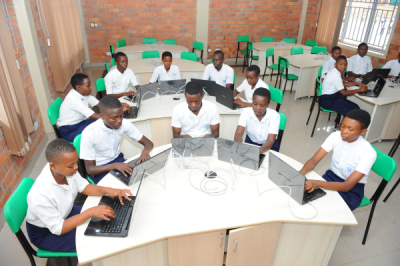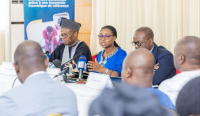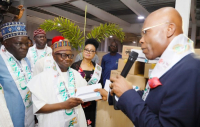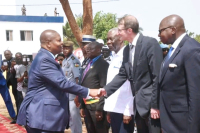
Public Management (483)
In sub-Saharan Africa, the chronic absence of civil servants tends to undermine many institutions. To address this growing phenomenon, governments are turning to digital technologies to provide adequate solutions.
The Gambia recently called on ministries, departments, and agencies to install biometric tallying systems to confirm the presence of civil servants at work. According to a memo issued by The Gambia's Ministry of Public Service, Administrative Reforms, Policy Coordination, and Implementation, the call is merely a reiteration of an earlier memo issued by the Secretary-General and Head of the Public Service in February 2021.
The memo instructs the concerned institutions to acquire and install the biometric attendance system, per the specifications, by the end of February 2023.
Recently in Kenya, the Nairobi County government made a similar decision. It announced that it would introduce a digital employee registration system and biometric identity cards to identify "ghost" employees at the town hall.
Johnson Sakaja, the governor of Nairobi, said the county had budgeted Ksh10 million ($79,000) for the project, which will identify irregular workers among the approximately 13,000 civil servants working for the city council.
Meanwhile, in Gambia, the government plans to replace ID cards with an electronic biometric tallying system, with data to be printed weekly and transmitted monthly to the secretary general and head of the civil service.
The new reforms aim to combat the ills that plague the sector (including absenteeism), modernize the administration, and reduce the huge wage bill that ghost workers impose on the government.
Samira Njoya
The Egyptian government has made citizen-centric digital transformation a key factor in its development. To achieve its goals, it has increased investment in the ICT sector.
Egyptian President Abdel Fattah al-Sissi (photo, center) recently called on his government to provide all necessary support to build and develop the skills of Egypt's youth, support start-ups and encourage their expansion in the ICT sector.
Last Saturday, during his meeting with Prime Minister Mostafa Madbouli and Minister of Communications and Information Technology Amr Talaat, the Egyptian president issued "directives to continue the state's efforts in digital transformation and the automation of administrative and governmental procedures." According to the presidency, the directives aim to "assist citizens and reduce time, effort and costs [...] while keeping up with the state-of-the-art technological applications in the field of artificial intelligence, whose importance and added value steadily increase globally."
In recent years, thanks to its digital strategy "Digital Egypt", the country has made significant progress in the digital sector. It has implemented several initiatives and projects, including "Egypt Digital Cubs", and digital innovation centers, as well as the development of Egyptian post offices, real estate registration offices, technology parks, and applied technology schools.
In July 2022, the government announced the allocation of a budget of EGP 6.025 trillion ($319.1 million) for digital and cybersecurity projects in the fiscal year 2022-2023. Specifically, EGP 5.4 trillion will be allocated to digital transformation projects and the development of digital skills.
The initiatives and efforts directed by the President of the Republic are in line with Vision 2030, the country's development strategy, which aims to strengthen economic and social development in all sectors and make the country a digital pole of excellence in Africa.
Samira Njoya
Thanks to the assistance, Kenya expects to complete its ongoing digital projects within ten years.
Last Thursday, the Kenyan Minister of Digital Economy Eliud Owalo (photo) indicated the country requested the World Bank's financial assistance for the partial implementation of its 100,000-km fiber deployment project.
“With Cabinet approval already in place, we are now set to roll out an initial 5,000 kilometers by June 2023. We are also in talks with the World Bank, through the National Treasury, to secure part of the funding for the digital superhighway, through the Kenya Digital Economy Acceleration Project (KDEAP),” the government official said speaking at the third edition of the digital summit organized by the Nation Media Group in Mombasa. The fiber optic project is part of the 2022-2023 National Digital Master Plan launched in April 2022.
During the digital summit, Eliud Owalo also announced other equally important digital projects, including the implementation of a national identity system by June, the integration of 5,000 government services on the e-citizen portal, and the digitization of the land registry which could potentially unlock 100 million shillings in revenue (about $790,000) from the land sector.
Samira Njoya
By setting up a series of digital projects, Angolan authorities want to meet citizens' need for electronic services, namely to facilitate access to some public services.
Angola will invest $89 million to build the national cloud infrastructure, train technicians, and store and unify government services, Communications Minister Mário de Oliveira (photo) announced last Thursday during the official launch of the cloud project.
"It's a unified government cloud built on government data centers to provide more than 80 services," said Mário de Oliveira, adding that the project includes the migration of existing applications and the development of new ones.
According to André Pedro, director of the National Institute for the Promotion of the Information Society (INFOSI), the project includes the construction of two data centers that will cover 5,320 square meters and house 204 server racks, thus reducing electronic communication costs for the government.
The technology project will also complement the Angolan State's dedicated network, which connects all ministries and the National Assembly with a 50 GB fiber ring. It is scheduled to be implemented within 15 months and completed between February and March 2024.
It is the result of a Memorandum of Understanding signed in December 2021 between the Angolan government and the United Arab Emirates. It will be implemented by INFOSI with the support of the Ministry of Communications, we learn.
According to Mário de Oliveira, the project aims to promote the digital development of the national economy, bring citizens closer to government action, promote the use of IT and cloud services, and lay the foundations for the digital transformation of the industrial sector.
Samira Njoya
Rwanda is among the African nations with a commendable level of digital readiness. All sectors are being transformed in the country, including education.
Rwanda wants to connect additional 3,000 schools to the internet by 2024, ICT Minister Paula Ingabire recently indicated during a Plenary Sitting of the Chambers of Deputies.
Responding to questions on the project, she responded "Currently, there are 6,756 schools, including elementary schools, secondary schools, and technical and vocational education and training (TVET) in the country. Of these schools, about 3,000, or 44.4% of the total, are not connected to the Internet."
"We have Smart Education Project, through the US$30 million financing we got from China Exim Bank, under which we will connect at least 1,500 schools," she added.
In addition to China Exim Bank, which is supporting the Rwandan government's digital transformation project, the World Bank approved US$100 million to finance the project in 2021. The aim was to boost access to broadband internet, increase digital use and enhance the digital innovation ecosystem.
According to Minister Ingabire, most of the financial resources were allocated to infrastructure for last-mile connectivity, including Internet access for schools. "By using the funds from the China Exim Bank, and those from the World Bank, it was observed that about 3,000 schools that are not connected to the internet will have access to it by 2024," she said.
For Emmanuel Mfitumukiza, president of the Rwandan chapter of the Internet Society, Internet connectivity in primary and secondary schools will help implement a skills-based curriculum and increase digital literacy in even the most remote schools in the country.
Samira Njoya
Broadband Internet service provider Starlink is currently pursuing its strategy to capture some 20 African markets. So far, the company has launched operations in Nigeria and is looking to do the same in Kenya and Tanzania.
The Tanzanian government has blocked the process that would allow Elon Musk (photo) and his company Starlink to provide Internet services in the country. On Wednesday, February 8, Tanzania Communication Regulatory Authority (TCRA)'s Director General Jabiri Bakari told the press that Starlink will have to complete essential documentation before the procedure can go ahead.
"You know, Starlink’s satellite internet involves much more issues than the way it is portrayed on social media platforms. It involves different particulars that need different requirements from the regulator in line with the type of license being applied for," Jabiri said.
On October 6, 2022, Starlink applied to provide its satellite internet services in Tanzania. After a meeting on January 27, 2023, some issues were still not resolved. The internet service provider blames the government for not communicating the documents required for the application. On Twitter, Elon Musk indicates that Starlink is ready and just waiting.
Starlink is slated to launch in Tanzania between January and April 2023, if the application is approved. The service will be available in Dar es Salaam, Arusha, Tanga, Tabora, and Mwanza. This will greatly boost the digital sector with the broadband internet connection provided.
Samira Njoya
In recent years, Benin has implemented a number of digital projects to facilitate access to basic services. This year, it intends to pursue its digital transformation.
Last Friday, Benenise Digital Minister Aurelie Adam Soule Zoumarou presented the 2023 agenda of the Ministry of Digital Economy. According to the official, "impact, resilience strengthening, and upscaling" will be the keywords in the digital sector in Bein this year.
Before the national assembly, Aurelie Adam Soule Zoumarou defended a 2023 budget of over XOF31 billion (US$49.2 million) for projects including the implementation of the newly-approved National Artificial Intelligence and Mega Data Strategy (SNIAM), the deployment of digital and e-service centers and the creation of a legal framework that will encompass the digital law, the digital broadcasting law, and the data protection law.
The agenda also includes the deployment of more mobile cell sites and the launch of 5G trials. Aurelie Adam Soule Zoumarou also announced two major reforms, namely the mutualization of efforts for the construction of passive infrastructures and the inclusion of basic digital training in conventional and certifying education programs.
The Ministry will also focus on pursuing the modernization of the state TV ORTB, launching the new state TV A+ Benin, establishing an organizational framework for the advertising industry, and the launch of digital terrestrial television with the marketing of TV decoders.
The 2023 agenda also plans for the extension of mobile coverage in rural zones and the deployment of digital community centers in eligible communities where the centers are not yet deployed.
Samira Njoya
Seventeen years after the 2006 population census, Nigeria wants to conduct its fifth census. For this edition, the country is betting on local tech firms for the supply of its digital equipment.
The Federal Government of Nigeria, through the National Population Commission (NPC), recently signed a groundbreaking US$184 million contract with Zinox Technologies, a local tech company based in Lagos. Under the contract, the local tech firm is to supply technology components and other accessories for the population scheduled for next March-April.
"It is a privilege for the Federal Government to consider us among many other companies in the world. They know we have the capacity. We are deploying all our resources to make sure it is successful," said Kelechi Okonta, CEO of Zinox Technologies.
Last February 4, Zinox supplied the NPC with about 100,000 of the PDAs needed for the census.
Between 2006 and 2010, the same company worked with the government for the voter registration process because the foreign tech companies hired by the Independent National Electoral Commission (INEC) were unable to deliver the equipment ordered in time.
At the time, it used its Z-Pad smart device (which INEC is still relying on) to lay the foundation for Nigeria's digital democracy. The successful execution of the US$200 million-plus INEC contract in 2010 positioned Zinex as a strong and skilled local firm.
Samira Njoya
The backbone, launched in 2019, is financed by the African Development Bank and the European Union to the tune of XAF22 billion.
Last Monday, the Central African Republic welcomed the CAR component of the Central Africa Fibre-Optic Backbone Project, which aims to provide broadband internet in the whole country.
According to President Faustin Touadera (photo, left), the efforts made by the government and its partners are aimed at creating an enabling environment in the field of telecommunications in the Central African Republic. "This new project, which is already operational, will first reduce internet costs and then create new jobs," he said.
The CAR component of the Central Africa Fibre-Optic Backbone Project, launched in 2019, is co-financed by the African Development Bank (AfDB) and the European Union to the tune of XAF22 billion (US$36 million). It interconnects the Central African Republic, Congo Brazzaville, and Cameroon. The project includes 935 kilometers of optic fiber network and 11 relay stations that are being built in Bangui and some strategic towns in the North-West.
According to the Central African government's web portal, the newly deployed backbone will increase tax revenues, reduce the cost of economic and social transactions, reduce the digital isolation of rural areas, promote regional integration, and revitalize the social pact with new employment opportunities for the youth.
For François-Xavier Decopo, coordinator of the CAR component, the next stage is the sales of fiber optic capacity to operators. "In September, an operator will come... The government will sign a public-private partnership agreement with another operator who will manage the infrastructure and sell fiber optic capacities to mobile operators like Orange, Telecel, and Socatel," he said.
Samira Njoya
In Kenya, the digitization of public services is one of the key focuses of the current government, which launched several projects to establish the required framework.
Kenya will start issuing digital birth and death certificates, as of March 1, 2023, the Ministry of Interior announced last week.
According to Julius Bitok (photo), Kenya's Principal Secretary for Immigration and Citizens Services, the launch of the e-service will coincide with the introduction of a unique personal identifier (UPI) that will act as a lifetime ID for newborns.
The certificates "will be accessed through e-citizen services, and people will be given what we call UPI. When you register, you will automatically receive the number that will become your birth certificate number," said Julius Bitok.
For several years now, getting administrative documents has proven difficult for Kenyans. To end the challenges they face, the government made public service digitalization one of its priorities.
The UPI is one of the results of that commitment. As its name suggests, it is a personal reference detail, similar to an ID card number. It will also serve as the death certificate number.
In addition to being used for birth and death registration, UPI will also serve as a school admission number as well as an index number for national examinations.
Samira Njoya
More...
With its digital footprint growing over the years, Africa has to deal with cyber threats that could jeopardize the development of its digital economy. This is the reason why most countries on the continent are betting on increased collaboration, with both regional and international partners, to clean their cyberspaces.
Last Monday, at the opening of the TAIEX INTPA International Strategic Seminar on Cybersecurity organized by the European Union and Cabo Verde, Cabo Verdean deputy Pirmer Minister Olavo Correia (photo, left) announced his country's plan to establish a national cybersecurity center.
He also appealed to the European Union for assistance with the implementation of that tedious project. "We want, along with the European Union, to work so that we have an effective National Cybersecurity Centre, so that we have a more robust regulatory framework so that we can be aligned with the best practices in terms of security," he said.
According to the government official, the planned center will allow Cabo Verde to deal with cyber-attacks and invest in the development of cybersecurity talents, which will also benefit other countries, notably West African neighbors.
The European Union replied it was ready to assist the country in the project given their common interests in data protection. "This is an area to which Cabo Verde attaches great importance and it is also an area to which we, the European Union, attach importance, not least because of the passage through the country of the EllaLink undersea cable, through which European data circulates, and it is also of interest to us to ensure the security of that data," said Carla Grijó (photo, ambassador), EU ambassador to Cabo Verde.
Samira Njoya
By introducing multipurpose cards, the government plans to address the ongoing challenges faced by citizens who have no identity documents and improve access to essential services.
Last Monday, Sierra Leonan President, Dr. Julius Maada Bio (photo, left), officially launched the production and verification of secure, multi-purpose biometric identity cards in Sierra Leone.
The new multi-purpose smart cards are the result of a public-private partnership between the Government of Sierra Leone and Constrat Systems (SL) Ltd. They are designed to facilitate the identification of every citizen, reduce the cost of financial transactions, and increase financial inclusion, among other things.
"With the chip-based biometric ID, banks, forex bureaus, micro-finance institutions, mobile money providers, and other financial service providers, among others, can now easily and effectively carry out the electronic know-your-customer (eKYC) process to authenticate and verify their customers at far lower costs for trusted financial transactions across Sierra Leone," the President said.
The new biometric card can be issued to Sierra Leonans (National ID cards), ECOWAS nationals (ECOWAS ID cards), and other foreigners (non-national ID cards). It will offer holders the possibility of carrying out transactions anywhere and at any time while enjoying the dual advantage of verifying their identity and being able to easily access the various social facilities provided by the government.
Let's note that in January, the Sierra Leone Civil Registration Authority (NCRA) and the Modular Open Source Identity Platform (MOSIP) signed a memorandum of understanding for the implementation of a national digital identification system.
Samira Njoya
DR Congo, which is confident that ICT tools can greatly contribute to emergence, is focused on building a unique digital ecosystem.
DR Congo is currently preparing for the upcoming launch of its intranet project in line with its strategy to digitize and modernize public services. The project was presented by the Ministry of Digital Affairs, last Thursday, after a meeting with various state institutions' representatives.
The national intranet will, among other things, interconnect public institutions in a single network and facilitate access and exchange of information between public services and citizens. It will also facilitate the delivery of public services by federal and local institutions, facilitate communications (email, IP phone, etc.), promote the smooth operation of ministries' and public administrations' websites, and boost the efficiency and effectiveness of the administration by pooling services.
According to Venceslas Katimba, advisor in charge of digital infrastructure and equipment, many things need to be done before the launch of that important digital infrastructure. They include upgrading government websites to required standards since only 21 of the 46 government websites have a web address and just 15 of those addresses use the "gouv.cd" top-level domain name.
Let's note that the various projects underway in the DRC are part of the National Digital Plan - Horizon 2025 which aims to leverage the digital industry for integration, good governance, economic growth, and social progress.
Samira Njoya
Like many African countries, Senegal is facing the thorny issue of electrical and electronic waste pollution. The situation recently worsened with the massive importation of electronic devices from other continents
The e-waste collection and dismantling center Senegal has been planning for years now will soon become effective, according to Cheikh Bakhoum, director general of state IT agency SENUM SA
" SENUM has decided to create a full-fledged entity that will be exclusively dedicated to this extremely important issue for our Environment and for our citizens. It will dismantle [...] electronic and electrical devices", said Cheikh Bakhoum.
"SENUM already has a section specifically dedicated to the management of electronic and electrical waste. It exclusively sorts them into green waste for recovery or red waste to be sent to a safe location for destruction," he added.
The e-waste (computers, phones, televisions, cables, batteries, etc.) issue is of great concern to the Senegalese government. In 2019, Senegal produced more than 4 million tons of e-waste according to the Solid Waste Coordination and Management Unit (UCG). Its average yearly e-waste production has surely risen due to population growth. From 16.3 million in 2019, Senegal's population was estimated at 17.3 million in 2022.
The dismantling center will significantly reduce the impact of electronic waste on the environment and health, improve income for informal collectors, and promote the creation of green jobs for the youth, among other things.
The country plans to recycle up to 90% of its e-waste by 2025. For that purpose, it is currently preparing a new legal framework for the activity.
Samira Njoya



